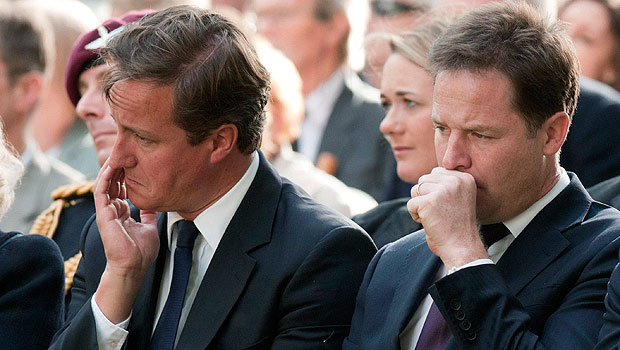Since being savaged in local elections last May by voters who saw no difference between them and the dominant center-right Conservatives, the Lib Dems have fought public battles for their own policies, and their ratings have at least stabilized.
The trick will be to keep on in that vein without undermining the idea of coalition government — an experiment for modern day politics in Britain, but the Lib Dems’ only realistic route to power.
The small center-left party, meeting in the central English city of Birmingham from this weekend, must in particular avoid damaging international confidence in the government’s ability to make spending cuts at a time of weak economic growth.
“They need to be very careful that it doesn’t tip too far the other way where the coalition seems to be continually rowing, and then people think coalition government doesn’t work,” said Chris Nicholson, head of the CenterForum think-tank.
In the latest row, Lib Dem politicians from leader Nick Clegg down declared their opposition to cutting Britain’s 50 percent top rate of income tax, a long-term Conservative ambition, until taxes were reduced for people on lower incomes.
The new-found assertiveness over taxation, banking and health service reform provoked Conservative legislators this month to ask Prime Minister David Cameron publicly whether he or Clegg was running the country.
The accusation was music to the ears of Lib Dem activists and lawmakers frustrated by the earlier reluctance to trumpet the party’s achievements in government.
“This nails the lie that the Lib Dems are patsies. We are having real influence,” said Norman Lamb, a Lib Dem lawmaker and senior aide to Clegg.
A senior Lib Dem official said the “differentiation” strategy would continue but insisted it would not prejudice the party’s commitment to the coalition’s austerity measures to reduce a record budget deficit over four years.
“We’ll still have to differentiate ourselves going forward, and the thing for the party and the leadership is to decide what those issues are, because you don’t want to differentiate on everything,” the official said.
Possible areas where the Lib Dems could become more distinctive include reviving an election promise to tax wealth by a levy on valuable houses, as well as demanding a more interventionist industrial policy to create jobs, CenterForum’s Nicholson said.
The Lib Dems and the Conservatives were unlikely ideological bed fellows after the 2010 election ended the Labour party’s 13-year hold on power.
However, personal chemistry between Clegg and Cameron helped to seal the agreement and the Lib Dems signed up to an austerity drive, alienating many of their supporters by backing higher tuition fees for university students.
Support for the Lib Dems has stabilized at around 12-13 percent in polls, down 10 points from last year’s election, but better than some party members had feared.
By contrast support for their Conservative partners remains close to the 36 percent gained in the May 2010 poll, with the opposition Labour party slightly ahead.
One restraint on the Lib Dems is the awareness they have no option but to continue with the coalition, as an early exit would be political suicide.
“We would lose on every count if we got out now,” said David Hall-Matthews, head of the Social Liberal Forum, an influential left-wing grouping in the party. “We would not be looking like we were principled, we would be looking like we weren’t cut out for government.”










